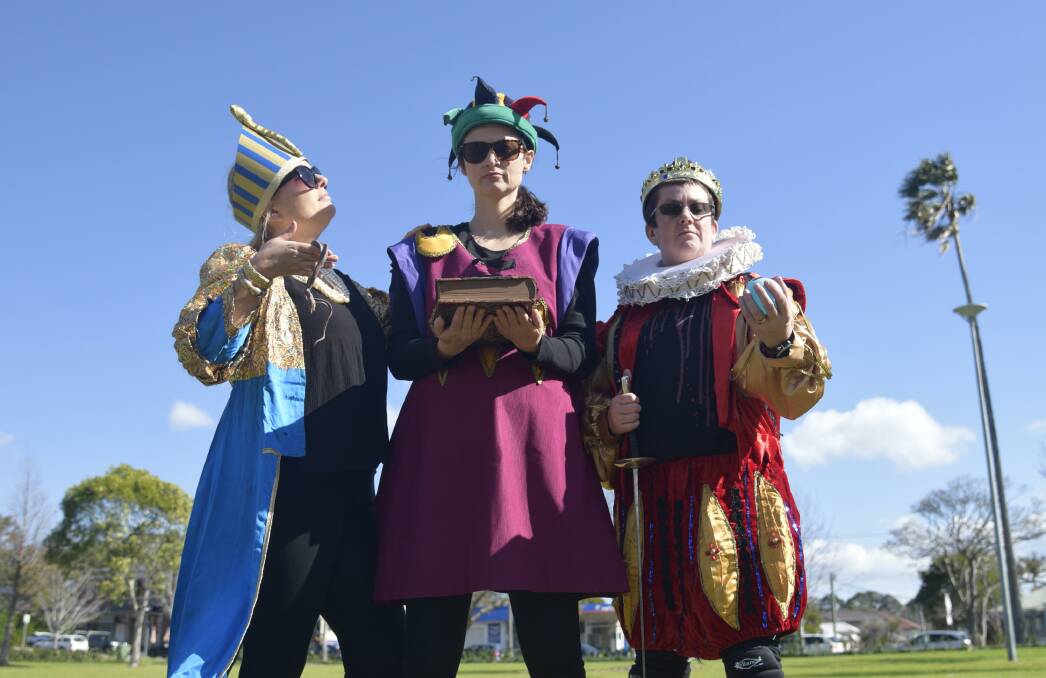
STOOGED Theatre’s announcement in November that it had decided to close came as no surprise because a majority of its members now live and work in Sydney, making rehearsals for Newcastle shows increasingly difficult.
Subscribe now for unlimited access.
$0/
(min cost $0)
or signup to continue reading
The announcement brought back memories of how much Stooged has done to change the nature of Newcastle theatre. It frequently staged the Australian premieres of overseas plays, with audience members riveted by what they were seeing. And other companies have emulated its achievements, with one or two Newcastle premieres each year of very different plays.
Stooged was established by Newcastle high school students in 2003, and its stage works attracted attention from beyond Newcastle. Gloucester residents saw an amusing and engaging production of a play by the Bard that was presented by some of the students when they were doing a theatre course at Newcastle University, and asked drama department officials if it could be staged at the next festival. Carl Young, the artistic director of Stooged from 2003 to 2016, was involved in seven festival plays before the annual Shakespeare festival at Gloucester ended in 2014, six presented by Stooged.
Stooged’s more recent productions also attracted interest from institutions beyond Newcastle. Its 2017 staging of Neighbourhood Watch, an Australian play about the interactions between suburban residents from very different backgrounds, was seen by a North Coast teacher. As the play is on a HSC reading list, she asked if it could be presented this year at Port Macquarie’s Glasshouse Theatre.
Stooged’s two 2018 Newcastle productions, Dead Centre and Sea Wall, a double bill of two 30-minute plays with the same characters, but by different playwrights, and The Dark Room, an Australian play set in a motel room near Alice Springs, with the story moving back and forth between three very different pairs of occupants, also had audiences watching intently.
The influence of Stooged could be seen in productions this year such as Knock and Run Theatre’s Year of the Rooster, the Australian premiere of a US play set in a country town, where a troubled man in his early 20s who is bullied by everyone, including his mother, takes up cock-fighting to try to get people to show more regard for him. The darkly funny play’s characters included Odysseus Rex, a rooster dressed like a feathered rocker, and an over-plump female chicken the young man rescued from a McDonald’s supplier. Ugly Mugs, the first production from new company GNaW Theatre, and written by Melbourne playwright Peta Brady, who has worked for 18 years with an organisation that helps sex workers who have been treated violently by clients, looked at a woman who had suffered that way, and a teenage boy trying to woo a football-playing girl.
Special event shows confirmed the diversity of Newcastle theatre. I Love Books, presented by magician Joel Howlett at various schools, had Howlett using his magic skills and the birds and animals he has in his routines to deliver brightly coloured stories largely drawn from books. The show was aimed at getting children to read books, and, at the school where I saw the show, some youngsters headed off to the library after it ended. Another show, The One, which looked at the very different lives of five young people, was staged in King Edward Park, with the audience sitting in rows of chairs opposite the park’s rotunda, with musicians and singers providing background music. Upstage Youth Theatre’s use of Blackett’s Barn at Tocal Homestead for the sheep-shearing comedy Pete the Sheep was certainly appropriate. And Circle Mirror Transformation (The Lowbrow Outfit and Theatre on Brunker) had watchers sitting behind the tables and chairs used by members of a six-week acting course as more and more was revealed about their lives and ambitions.
Theatre companies did interesting things with plays. The comedy The Complete Works of William Shakespeare (Abridged) was written and performed in the late 1980s by three American males. Newcastle Theatre Company, however, staged it with three females, who did amusing things with the male characters. The writing trio was sent the Herald preview about the production and put it on the show’s website. Their comments showed they were impressed by the change.
Newcastle’s reputation for presenting very enjoyable musicals was confirmed by shows including Opera Hunter’s The Sound of Music, The Very Popular Theatre Company’s show billed as “A Mystery Musical”, which turned out to be The Addams Family, and the first major production of new company High Street Productions, The Drowsy Chaperone. The latter show, subtitled “a musical within a comedy”, had an aged musical theatre fan listening to a vinyl recording of a 1928 musical, with the characters he remembered coming alive behind him and doing all manner of amazing things, such as the musical’s bridegroom-to-be doing a skateboard dance routine while blindfolded.
The year had a good collection of locally written plays, among them two from youth group Bearfoot Theatre: Take Me to Neverland, by Riley McLean, which, largely set in a mental asylum, presented a more down-to-earth version of the story of Peter Pan, and I Hope It’s Not Raining in London, by 18-year-old Nicholas Thoroughgood, which intriguingly had the sexes of two troubled young people sharing an apartment changing from show to show. Anna Kerrigan’s Dark Matter (Aspire) engrossingly showed, through dialogue, song and dance, the reactions of the students, teachers and staff, to a lockdown that forced them to stay inside the school.
The variety of shows was incredible, with the success of the classic Australian play, Summer of the 17th Doll, leading Newcastle Theatre Company to decide to stage in 2019 another play in the Doll trilogy, Kidstakes. And Maitland Repertory Theatre’ presentation of a radio-play style adaptation of the classic film It’s a Wonderful Life confirmed how wonderful the film is.

